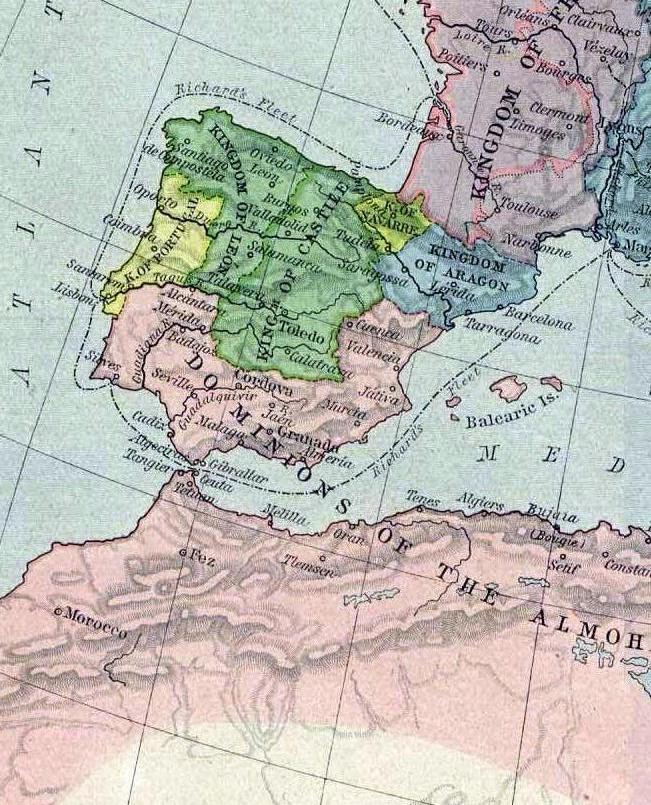Above: Iberia in 1190
SAINT TERESA OF PORTUGAL (1178-1250)
Princess, Queen, and Nun
Her feast = June 17
sister of
SAINT SANCHIA OF PORTUGAL (1182-1229)
Princess and Nun
Her feast = June 17
sister of
SAINT MAFALDA OF PORTUGAL (1204-1252)
Princess, Queen, and Nun
Her feast transferred from May 2
++++++++++++++++++++++++++++++++++++++++++++++++++++++++++++++++
Today I add to my Ecumenical Calendar of Saints’ Days and Holy Days three sisters, members of the royal house of Portugal. Theirs was a world different from ours. Theirs was a world of absolute monarchies, arranged marriages, and an Iberian peninsula divided among several kingdoms and between two religions. Shall we begin?
Sts. Teresa (1178-1250), Sanchia (1182-1229), and Mafalda (1204-1252) were daughters of King Sancho I of Portugal (reigned 1185-1211). Sancho’s son Alfonso II (reigned 1211-1223) succeeded to the throne immediately. The Kings of Castille and Leon were close relatives. So it was that Rome anulled the marriage of St. Teresa to her cousin, King Alfonso IX of Leon (reigned 1188-1230), and the union of St. Mafalda and her cousin, King Enrique I of Castille (reigned 1214-1217), on the grounds that everybody was too closely related. These were arranged marriages. And both Mafalda and Enrique were minors; she was eleven years old on her wedding day. It was, as I wrote, a different time.
St. Teresa, no longer married (yet the mother of two daughters and a son) returned to Portugal and founded a double monastery on the grounds of the family estate at Lorvau. She became a nun there after 1230, when she settled the succession dispute in Leon. Alfonso IX had died. His widow, another cousin named Berengaria, whose marriage Rome also anulled, asked the first wife to solve the problem of succession. St. Teresa permitted Beregaria’s son Fernando III of Castille (reigned 1217-1252) to rule in Leon.
St. Mafalda, upon her return to Portugal, entered religious life at Arouca Convent. She used her royal connections to obtain generous funding for a home for a widows, a hostel for travelers, the restoration of Oporto Cathedral, and other charitable works.
St. Sanchia retired from court life upon the death of her father in 1211. She helped the Francicans and the Dominicans expand into Portugal. And she founded a convent at Celles and became a nun there.
I could take this opportunity to defend the merits of monasticism against those who impugn it, but I have done so in other posts; I do not feel like repeating myself in that regard at this time. But I do make this point: These women, within the rules of society at their place and in their time, pursued holy lives. They helped other people and did not use their royal connections for their own benefit. We should honor their memories and thank God that they lived.
KENNETH RANDOLPH TAYLOR
MAY 16, 2012 COMMON ERA
THE FEAST OF SAINTS ANDREW FOURNET AND ELIZABETH BICHIER, COFOUNDERS OF THE DAUGHTERS OF THE CROSS; AND SAINT MICHAEL GARICOITS, FOUNDER OF THE PRIEST OF THE SACRED HEART OF BETHARRAM
THE FEAST OF SAINT JOHN NEPOMUCENE, ROMAN CATHOLIC PRIEST
THE FEAST OF THE MARTYRS OF SUDAN
THE FEAST OF TE WERA HAURAKI, ANGLICAN MISSIONARY
+++++++++++++++++++++++++++++++++++++++++++++++++++++++++++++++++++++++++++
O God, whose blessed Son became poor that we through his poverty might be rich:
Deliver us from an inordinate love of this world,
that we, inspired by the devotion of your servants
Saint Teresa of Portugal,
Saint Sanchia of Portugal, and
Saint Mafalda of Portugal,
may serve you with singleness of heart,
and attain to the riches of the age to come;
through Jesus Christ our Lord, who lives and reigns with you,
in the unity of the Holy Spirit, one God, now and for ever. Amen.
Song of Songs 8:6-7
Psalm 34
Philippians 3:7-15
Luke 12:33-37 or 9:57-62
—Holy Women, Holy Men: Celebrating the Saints (2010), page 722


You must be logged in to post a comment.